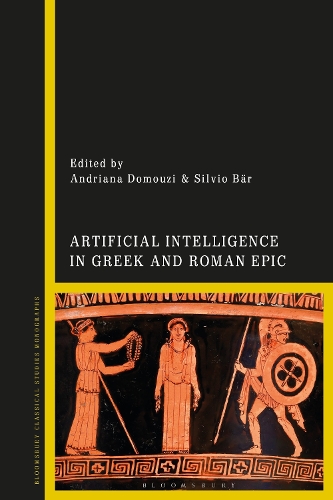
Artificial Intelligence in Greek and Roman Epic
(Paperback)
Available Formats
Publishing Details
Artificial Intelligence in Greek and Roman Epic
By (Author) Dr Andriana Domouzi
Edited by Professor Silvio Br
Bloomsbury Publishing PLC
Bloomsbury Academic
11th December 2025
United Kingdom
Classifications
Tertiary Education
Non Fiction
880.09356
Physical Properties
Paperback
320
Width 156mm, Height 234mm
Description
This is the first scholarly exploration of concepts and representations of Artificial Intelligence in ancient Greek and Roman epic, including their reception in later literature and culture. Contributors look at how Hesiod, Homer, Apollonius of Rhodes, Moschus, Ovid and Valerius Flaccus crafted the first literary concepts concerned with automata and the quest for artificial life, as well as technological intervention improving human life.
Parts one and two consider, respectively, archaic Greek, and Hellenistic and Roman, epics. Contributors explore the representations of Pandora in Hesiod, and Homeric automata such as Hephaestus wheeled tripods, the Phaeacian king Alcinous golden and silver guard dogs, and even the Trojan Horse. Later examples cover Artificial Intelligence and automation (including Talos) in the Argonautica of Apollonius and Valerius Flaccus, and Pygmalions ivory woman in Ovids Metamorphoses. Part three underlines how these concepts benefit from analysis of the ekphrasis device, within which they often feature. These chapters investigate the cyborg potential of the epic hero and the literary implications of ancient technology. Moving into contemporary examples, the final chapters consider the reception of ancient literary Artificial Intelligence in contemporary film and literature, such as the Czech science-fiction epic Starvoyage, or Small Cosmic Odyssey by Jan Kresadlo (1995) and the British science-fiction novel The Holy Machine by Chris Beckett (2004).
Reviews
In a world that is currently engaging with AI to an unprecedented degree, this is a timely publication that casts our view back in time to offer new ideas about the ancient notion of AI and how it is presented specifically in ancient Greek and Roman epic poetry. -- Maria Gerolemou, Visiting Assistant Professor, Johns Hopkins University, USA
Author Bio
Andriana Domouzi is Postdoctoral Researcher in Classics and Theatre Studies at the National and Kapodistrian University of Athens, Greece.
Silvio Br is Professor of Classics at the University of Oslo, Norway.
